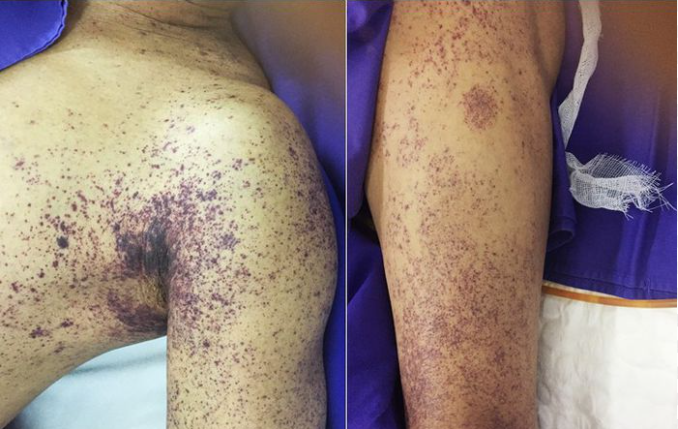GĐXH - Streptococcus is the cause of many dangerous diseases such as pharyngitis, sepsis, pneumonia and even life-threatening if not treated promptly. This bacteria is transmitted through the respiratory tract, direct contact or contaminated food. So what is streptococcus, how dangerous is it and how to prevent it effectively? Find out now to protect your health!
Streptococcus: Causes, symptoms, effective treatment and prevention
Streptococcus is a group of bacteria that causes a wide range of illnesses, from mild infections like sore throats to serious illnesses like sepsis or meningitis. If not detected and treated promptly, streptococcus can cause serious complications, affecting health and life.
So what is streptococcus, what are the causes of infection, what are the symptoms and how to prevent it effectively? Let's find out in this article!

People with streptococcal sepsis. (Photo: TL)
What is streptococcus?
Streptococcus is a group of spherical bacteria, usually arranged in chains. They can live parasitically on the bodies of humans and animals without causing disease, but when conditions are favorable, they can cause dangerous infections.
Based on biochemical properties and pathogenicity, streptococci are divided into many groups, but the most common are:
- Group A streptococcus (Streptococcus pyogenes): Causes pharyngitis, scarlet fever, skin infections and cellulitis.
- Group B streptococcus (Streptococcus agalactiae): Mainly causes disease in newborns and pregnant women, can lead to pneumonia or sepsis.
- Group D streptococcus (Enterococcus): Causes urinary tract infections, endocarditis and sepsis.
Causes of streptococcal infection
According to Master, Specialist Doctor II Hoang Quang Trung, Director of Ha Tinh General Hospital, streptococcal infection often occurs when Streptococcus bacteria enter the body through the following routes:
Streptococcus can be transmitted through the respiratory tract.
- Streptococcal infection can be caused by contact with saliva, nasal and throat secretions of an infected person through coughing, sneezing or talking.
- Patients can share personal items such as cups, spoons, towels, etc. with people infected with streptococcus.
Streptococcus can be transmitted through direct contact.
- Touching damaged skin or open wounds containing bacteria.
- Contact with sick people without protection.
Streptococcus is transmitted through food and water sources.
- Eating undercooked food or drinking contaminated water.
- Contact with animals carrying bacteria without washing hands thoroughly.
Streptococcus transmitted from mother to child
Pregnant women infected with group B streptococcus can pass the infection to their babies during childbirth, endangering the newborn.
Other causes of streptococcus
In addition to some of the above causes, some other causes leading to streptococcus can be mentioned as:
- Contact with open wounds, bacteria can enter through scratches, cuts or wounds that are not properly cleaned, making people susceptible to streptococcal infection.
- In addition, consuming undercooked foods is also a common cause of streptococcus. In particular, undercooked pork or pork products can contain Streptococcus suis, which causes serious infections.

Streptococcal infection can be life-threatening if not treated promptly.
Signs of streptococcal infection
Symptoms of streptococcal infection depend on the type of bacteria and the location of the infection. Common signs include:
Strep throat
People infected with streptococcus bacteria can get strep throat. The patient may experience symptoms such as sore throat, difficulty swallowing, high fever, headache, swollen tonsils with white pus, swollen and painful lymph nodes in the neck, etc.
Streptococcal dermatitis
Patients may have streptococcal dermatitis, accompanied by symptoms such as: rash or skin ulcers, patients may feel chills and high fever, pus in the wound, redness, swelling, etc.
Streptococcal sepsis
People with streptococcal sepsis will have symptoms such as: high fever, chills, rapid heartbeat, low blood pressure, etc. In particular, the patient will feel their body is weak and their consciousness is disturbed.
Streptococcal pneumonia
People with streptococcal pneumonia will notice changes in their body such as: coughing up green or yellow phlegm, feeling tired, having difficulty breathing, chest pain, accompanied by a high fever that lasts a long time.
In case the patient shows serious signs such as high fever that does not subside, difficulty breathing, coma, they should go to a medical facility immediately for timely treatment.
How to treat streptococcal infection
Treatment of streptococcal infections must be done promptly and correctly to avoid dangerous complications. Medical experts recommend:
Using antibiotics to treat streptococcal infections
Doctors usually prescribe antibiotics such as penicillin, amoxicillin, or ceftriaxone to kill the bacteria. In cases of penicillin allergy, erythromycin or azithromycin may be used.
Supportive treatment for symptoms of streptococcal infection
When a patient has symptoms of streptococcal infection, it is necessary to rest, drink enough water, and use pain relievers and fever reducers if necessary. Continuous monitoring and medical care are necessary to ensure the effectiveness of treatment.
Treatment of severe streptococcal infections
If sepsis or meningitis occurs, the patient may need to be hospitalized for intravenous antibiotic treatment.
Some severe cases may require surgical intervention to remove infected tissue.
How to prevent streptococcus effectively
Maintain personal hygiene to avoid streptococcal infection
- Wash your hands regularly with soap or sanitizer.
- Cover your mouth when coughing or sneezing to avoid spreading germs.
- Do not share personal items with others.
To avoid streptococcal infection, eat and live a healthy lifestyle.
- Cook food thoroughly, avoid eating raw food.
- Drink clean water, avoid contact with polluted water sources.
- Strengthen resistance with a nutritious diet.
Regular health check-ups to detect streptococcal infection early
- Regular health check-ups to detect related diseases early.
Pregnant women should be tested for group B streptococcus to protect their fetus.
Vaccination
Some diseases caused by streptococcus bacteria, such as pneumonia, can be prevented with vaccines. Get vaccinated as recommended by your doctor.
Streptococcus is a group of bacteria that can cause a wide range of infections, from mild to serious. Understanding the causes, symptoms, and prevention can help you take better care of your health.
If you have signs of streptococcal infection, go to a medical facility immediately for timely diagnosis and treatment. Do not be subjective, because severe infections can be life-threatening.
Source: https://giadinh.suckhoedoisong.vn/canh-bao-lien-cau-khuyen-co-the-gay-nhiem-trung-huyet-de-doa-tinh-mang-172250311153507546.htm



![[UPDATE] April 30th parade rehearsal on Le Duan street in front of Independence Palace](https://vstatic.vietnam.vn/vietnam/resource/IMAGE/2025/4/18/8f2604c6bc5648d4b918bd6867d08396)


![[Photo] Prime Minister Pham Minh Chinh receives Mr. Jefferey Perlman, CEO of Warburg Pincus Group (USA)](https://vstatic.vietnam.vn/vietnam/resource/IMAGE/2025/4/18/c37781eeb50342f09d8fe6841db2426c)























































































Comment (0)